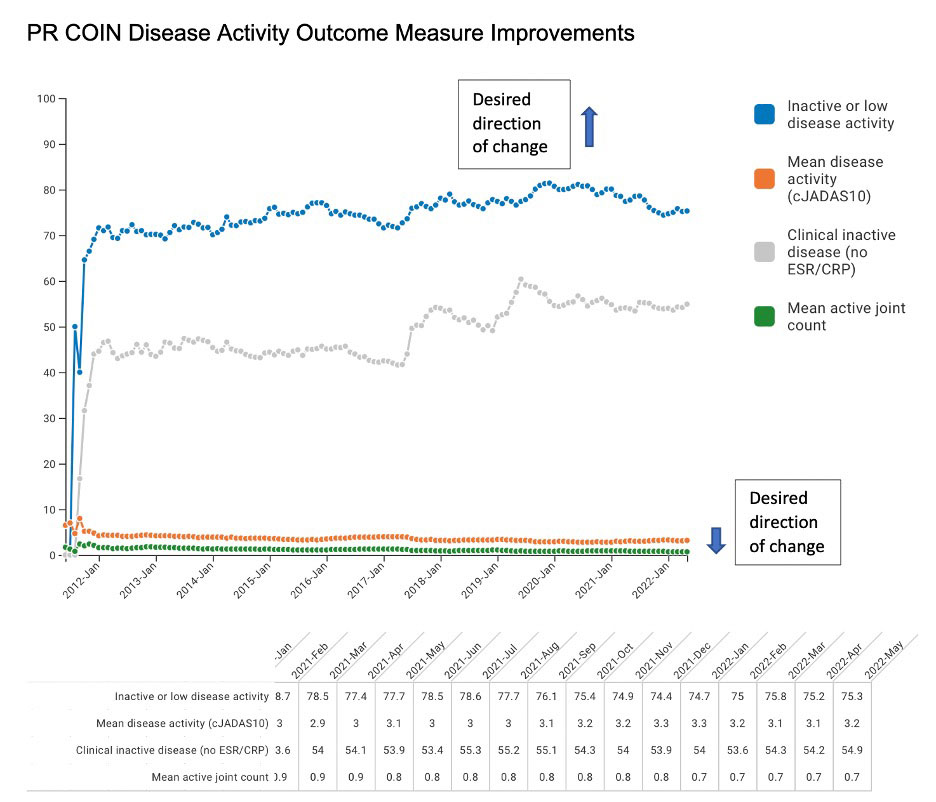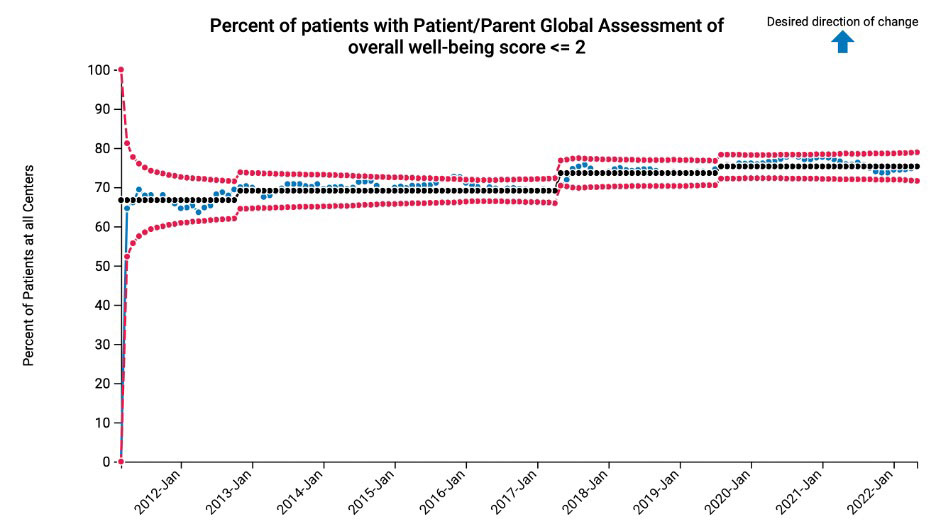Session Information
Session Type: Poster Session C
Session Time: 1:00PM-3:00PM
Background/Purpose: Pediatric Rheumatology Care and Outcomes Improvement Network (PR-COIN) is a Learning Health Network designed to improve outcomes of care for children with juvenile idiopathic arthritis (JIA). Currently, 23 pediatric rheumatology centers in North America participate, and a subset are currently entering data into a network Registry with a goal to report performance on process and outcome quality measures (QMs) to drive improved outcomes.
Methods: PR-COIN centers learn and use established quality improvement (QI) methodology to conduct improvement work. Since 2011, participating sites have entered data from JIA clinical encounters into a shared Registry. Performance on QMs is reported on statistical process control charts for both site-specific and aggregate data to identify significant change in performance, or special cause variation. Disease specific outcome measures include the clinical Juvenile Arthritis Disease Activity Score (cJADAS10), clinically inactive disease (CID), active joint count (AJC), and the time to inactive disease or low disease activity (LDA). Patient-reported outcomes measures (PROMs) include optimal physical function, low or no pain as defined as arthritis pain score < /=3, and patient global assessment of overall well-being (PtGA).
Results: Recent PR-COIN performance data includes 2043 children with JIA, and a total of >8200 children with JIA have been enrolled in the PR-COIN Registry since 2011. Disease activity outcomes have improved over time including mean AJC, mean cJADAS10, percent of patients with oligoarticular or polyarticular JIA who have inactive disease or LDA by cJADAS10, and percent of patients with CID (excluding inflammatory markers) (Figure 1). PROMs have also improved including mean PtGA, percent of patients with PtGA < /= 2, percent of patients with optimal physical function, and percent of patients with low or no pain (Figure 2). Figure 3 illustrates the control chart showing improvement in percentage of patients with PtGA < /=2 from 67% to 75%. Recent data reflects approximately 37% of the patients enrolled in the PR-COIN Registry and currently receiving pediatric rheumatology care at PR-COIN sites.
Conclusion: PR-COIN, a multi-center learning network implementing QI science that utilizes a shared Registry to report QMs and identify best practices, has demonstrated success in improving outcomes for children with JIA. Ongoing analysis of outcome performance will continue as more patients are included in the Registry. Data quality efforts are underway to ensure complete and representative data.
To cite this abstract in AMA style:
Bingham C, Harris J, Vora S, Gilbert M, Yildirim-Toruner C, Ferraro K, Qiu T, Burnham J, Batthish M, Gottlieb B, Lovell D, Laxer R, Lee T, Bullock D, Spencer C, Weiss J, Hazen M, Oberle E, Mannion M, Pan N, Shishov M, Fair D, Toth M, Wiegand K, Morgan E. Pediatric Rheumatology Care and Outcomes Improvement Network Demonstrates Outcome Improvement for Children with Juvenile Idiopathic Arthritis [abstract]. Arthritis Rheumatol. 2022; 74 (suppl 9). https://acrabstracts.org/abstract/pediatric-rheumatology-care-and-outcomes-improvement-network-demonstrates-outcome-improvement-for-children-with-juvenile-idiopathic-arthritis/. Accessed .« Back to ACR Convergence 2022
ACR Meeting Abstracts - https://acrabstracts.org/abstract/pediatric-rheumatology-care-and-outcomes-improvement-network-demonstrates-outcome-improvement-for-children-with-juvenile-idiopathic-arthritis/



